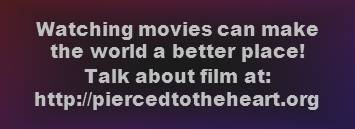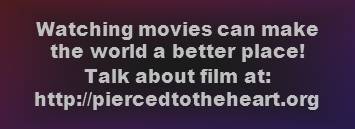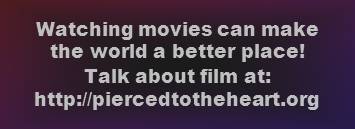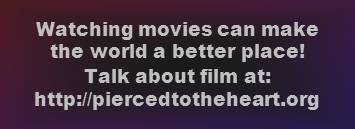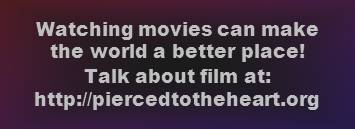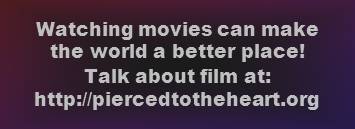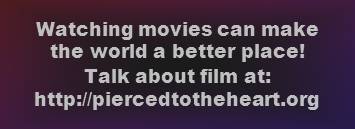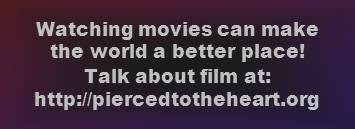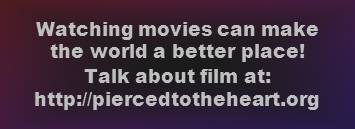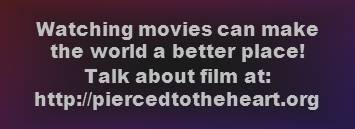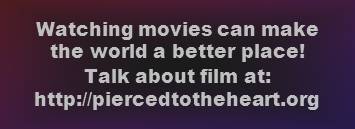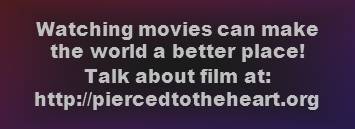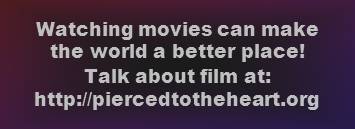All nine Oscar 2012 Best Picture nominations are strong thematically, exploring important questions of the heart. Most are also very well made, and I had to struggle to keep my top tier list small. To the concerns of some conservative viewers, who complain …more »»
Film Talks opened in: 2012
2016: Obama’s America (2012)
(Before viewing)
by Randy Heffner — September 25, 2012
In 2016: Obama’s America, Dinesh D’Souza does an interesting thing: He paints a picture of what the USA will look like in the future based on a presidential candidate’s past associations. Hmmm. It’s an important question to ask, yet …more »»
Argo (2012)
(Before viewing)
by Randy Heffner — November 3, 2012
Argo succeeds quite well as an action-suspense film, with excellent storytelling and filmcraft. Beyond that, it admirably touches on issues of trust, loyalty, and the difficulty of …more »»
The Artist (2011)
(Before viewing)
by Randy Heffner — January 1, 2012
The Artist is a silent film like few others — perhaps unlike any other. Simultaneously staying true to the genre and playing with it, director Michel Hazanavicius creatively employs silent film as one element of great storytelling and filmcraft — and manages to do so without falling into …more »»
Beasts of the Southern Wild (2012)
(Before viewing)
by Randy Heffner — September 10, 2012
In 2011, The Tree of Life was the notable “alternate type” of film experience. For 2012, it’s Beasts of the Southern Wild — and it’s a good thing in both cases. …more »»
Cloud Atlas (2012)
(Before viewing)
by Randy Heffner — November 11, 2012
Loosely weaving many lives together over a period of perhaps 500 years or more, Cloud Atlas explores the interconnectedness and interdependencies of our lives. Across past, present, and future, the film presents varying embodiments of …more »»
Coriolanus (2011)
(Before viewing)
by Randy Heffner — March 22, 2012
Without a doubt, Coriolanus is Shakespeare done well. Intense and engaging, the film uses the play’s original language and cities but sets it in modern times, reducing the historical …more »»
Django Unchained (2012)
(Before viewing)
by Randy Heffner — December 29, 2012
Slavery was (and is) a horrible thing, and Django Unchained explores 1800s USA slavery with unblinking intensity, insightful juxtapositions, and indulgent relish. It’s this last bit that …more »»
Extremely Loud & Incredibly Close (2011)
(Before viewing)
by Randy Heffner — January 29, 2012
A father’s unique and creative care for his son, which is at the center of Extremely Loud & Incredibly Close, carries profound power of hope and healing — even when the father can’t be there. The film embodies this power strongly in its …more »»
Godspell (1973)
(Before viewing)
by Randy Heffner — January 6, 2012
Playfully serious, musically excellent, and rich in spirit, Godspell romps through New York City exploring and embodying wisdom for life and relationships from the Bible’s Gospel According to Matthew. Set in 1973, Jesus …more »»
Godspell (1973)
(After viewing)
by Randy Heffner — January 6, 2012
It must have been about the third time that I watched Godspell — over the space of 30 years or so — that I finally was able the feel the full joy of the film. I had come finally to understand the how the film embodies the critical depth of life (as opposed to religion) that Jesus had come …more »»
Godspell (1973)
(Backstory)
by Randy Heffner — January 6, 2012
The big picture behind Godspell
When a film dwells heavily in the content of a particular organized belief system, the way that Godspell dwells in Christianity, a couple of the main backstory questions to arise are “What were the beliefs of the creators?” and “How do those beliefs factor into what they were trying to do with the show?” For the film Godspell, the three most significant creators to consider, and their main orientations toward the work, are:
- John Michael Tebelak originally created Godspell as a small production for work on his master’s in drama at Carnegie-Mellon University. A member of the Episcopal church, even at one point considering the priesthood, Tebelak credited a specific inspiration for the show: An Easter Vigil service (i.e., an anticipation of the Resurrection) that left him feeling that they treated Jesus as more dead than alive. He had been re-reading the Gospels in the Bible as a potential source for material, and in them found “a great joy, a simplicity.” The stark contrast between this and his experience at the Vigil sparked a rapid burst of writing to create Godspell. With Godspell, Tebelak said he “wanted to make it the simple, joyful message that I felt the first time I read them and recreate the sense of community.” For the “clown” schtick in Godspell, Tebelak’s inspiration was the book Feast of Fools
by Harvard’s Harvey Cox (especially the chapter “Christ the Harlequin”).
- Stephen Schwartz was brought in later to re-write the music for Godspell. Schwartz’s primary focus with Godspell is on the community being built by the disciples; he downplays a focus on Jesus. He was not so much a fan of the film version. Schwartz has said that, prior to doing Godspell, he “didn’t really know anything about” Jesus beyond the general story “of his birth and then his death and the belief of some in his Resurrection.” Godspell gave Schwartz a stronger appreciation for the Golden Rule (i.e., “do to others as you would have them do to you.” As a matter of policy, Schwartz does not publicly disclose his religious/metaphysical beliefs.
- David Greene directed the Godspell film. I was unable to turn up anything beyond biographies of Greene’s professional work — nothing specifically about his views of or work on the film.
I find that Tebelak’s vision comes through strongly in the film. Furthermore, I find it significant that Tebelak’s vision was sparked by his attendance at a service of observance of the Resurrection. Though neither the film nor the stage play contain a literal depiction of the Resurrection, Tebelak’s response to observing a failure-of-life in the Easter Vigil led him to Godspell, whether intentionally or not, as an expression of the deeper point of the Resurrection: that life comes through death. In the grand narrative of Christianity, it is through Jesus’ death and Resurrection that we have life, yet even in small ways, such as one’s forgiving a small offense, there are small deaths that lead to life (i.e., giving up one’s “right” to revenge).
Schwartz’s focus on community (shared also by Tebelak) is a strong and important element of a life-giving response to Godspell — and to Jesus himself. Schwartz’s general lack of knowledge of Christianity did not prevent him from capturing and reinforcing the strong spirit of Christian life in Tebelak’s vision. Perhaps his lack of Christian knowledge is also part of his downplaying a focus on the importance of Jesus’ teachings.
Once a work of art is complete and its creator(s), not being a part of the work, fade to the background, the work is there to stand on its own. The context and intent of its creation is still there, relevant, and interesting, yet a work may speak things that the creator(s) never even considered. Thus, even if Tebelak’s background and vision were not centered in appreciation of what Christianity should work in one’s spirit and life, I would hold it valid to read Godspell as a beautiful embodiment of the life Jesus came to bring and valid to place as much (if not more) focus on how his teachings lead to life as on the bonding of a community. The fact that these were Tebelak’s vision simply strengthens the reading of Godspell as such.
Other interesting points
Some other backstory points are worth noting about Godspell:
- Bethesda Fountain, with its Angel of the Waters statue where the disciples first gather for the baptism scene, was designed in reference to John 5:2-9, where the waters of the pool of Bethesda were said to have healing powers whenever an angel would stir the water.
- After the Rodney King riots in Los Angeles in 1992, Schwartz rewrote the lyrics to "Beautiful City." He finds his original lyrics to be "'drippy' and somewhat cloying." Certainly the updated lyrics recognize explicitly the brokenness of our world (e.g., "Out of the ruins and rubble" and "When your trust is all but shattered / When your faith is all but killed"), whereas the original centers on the desirability of the vision (e.g., "We're not afraid of voicing / All the things we're dreaming of" and "We see nations rise / In each other's eyes"). Perhaps both together make a complete vision (both are listed here, with the newer version noted as the "alternate").
- In a short piece, Joseph Barton of Brooklyn Preparatory School, provides a few extra quotes by Tebelak that confirm and expand Tebelak's vision as noted above. In particular, Peggy Gordon, a member of the cast and co-writer of the song "By My Side," quoted Tebelak as saying the show was intended to "weave God's spell over the audience."
- The Godspell Motto, repeated by the cast before each performance, is a beautiful quick mediation on being loving, teachable, and growing. As it has to do with the staging of the show, I find "Speak in a low, persuasive tone" to be the most significant part. It mitigates against the show being just a series of gags by encouraging the cast to have a tone of seriousness in the midst of the fun.
- As Schwartz notes in 1999 notes for the stage play, several of Godspell's songs were largely based on the Episcopal hymnal, including "Save the People", "Day by Day", Bless the Lord", "All Good Gifts", and "Turn Back, O Man". Lyrical adaptations from the Bible include "On the Willows" (Psalm 137), "Light of the World" (Matthew 5), and "Alas for You" (Matthew 23). However, in 1982, "Turn Back O Man" was proposed to be removed from the hymnal for reasons of unsound theology (specifically, it was thought that the hymn inappropriately fostered the notion "that the initial and fundamental steps towards salvation are made by human effort, apart from the assistance of divine grace").
- The song "We Beseech Thee" is in the stage play, but film director David Greene thought it wouldn't work for the film. So he asked Schwartz to write another song and (the original) "Beautiful City" was the result. A fan used a recording of "We Beseech Thee" and clips from the film to create this video (after you play it, YouTube may well show you other videos of Godspell stagings).
Other interesting links
- The Godspell section of MusicalSchwartz.com, a fansite for Stephen Schwartz — go toward the bottom of the page for content about Godspell's history and backstory.
- The FAQ at Stephen Schwartz's official site, which has a few interesting questions and answers about the show.
- The forum archives at Stephen Schwartz's official site, which has a history of questions Schwartz has answered about Godspell, his life, and (what he will say in regard to) his religious/metaphysical beliefs. There are many separate parts of the archive. Look first under the Godspell sub-heading and the "Stephen Schwartz" main heading.
- On MusicalSchwartz.com, Peggy Gordon talks about the meaning of the song "By My Side".
- Wikipedia article's listing of locations used in the film.
The Help (2011)
(Before viewing)
by Randy Heffner — February 7, 2012
Curiously, The Help works as a film — it can reach inside and grab us, sending us away as better people with deeper hearts to resist thinking ourselves superior. I say “curiously” because it has a major filmcraft weakness that doesn’t seem to …more »»
Hugo (2011)
(Before viewing)
by Randy Heffner — February 2, 2012
Have you thought of the world as a machine? For me, the question carries connotations of a cold, heartless world of isolation and exploitation. Embedded within Hugo’s exploration of other matters of the heart, the film uniquely explores “machine nature” from …more »»
Life of Pi (2012)
(Before viewing)
by Randy Heffner — December 18, 2012
Whether your belief system is atheist, agnostic, or theist, Life of Pi has something important for you. Whenever a film is adapted from a book, there’s always the question of comparison between the two. With Pi, this question is not simply …more »»
